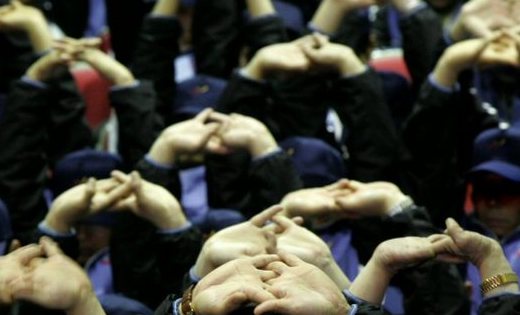Posted on : Dec.14,2006 15:28 KST
Modified on : Dec.15,2006 21:00 KST
 |
|
Homeless people, raising their hands over their heads in an exercise.
.
|
Detention without cause, theft of patients' money among discoveries
The government's human rights organ has revealed a small picture of human rights violations occurring in South Korea's mental hospitals, revealing stories of detention without doctor's orders and the pilfering of money earmarked for patients.
On December 13, the National Human Rights Commission of Korea announced the results of its investigation into two mental hospitals in Busan. The following are several of the stories uncovered.
The loss of 13 years
Thirteen years ago, a 72-year-old carpenter, only identified as his surname Kim, was taken by police to a mental hospital in Busan. At that time, he had soju with his friends and was heading toward his sister's home. On the way, he stopped on the street to watch people playing Janggi, a traditional Korean game using wood blocks, and was apprehended by police and handed over to the mental hospital. Before South Korea's democratization, homeless and the down-and-out were reportedly often rounded up by the police without due legal process in order to "clean up" the streets. Those rounded up were often sent to mental hospitals, as there were ways to keep the people from getting out.
He has never left the hospital for a single time over the past 13 years. No particular treatment was ever given, but so far the government has paid about 930,000 won (US$970) a month to the hospital for Kim's "care," as he is eligible to receive medical aid from the government.
Kim works for eight hours a day there under his "treatment" program, and the hospital pays him 110,000 won a month. While Kim has been able to leave the hospital, or even seek work outside, he has been thoroughly isolated by his hospitalization. Although 13 years later, he has no place to go if he is discharged, he says he does not want to die at the hospital.
Hospitalization without a doctor's orders
According to the commission's investigation, 27.4 percent of the patients at the two hospitals, or 187 people, were hospitalized without a doctor's diagnosis.
For homeless people without a family, the number stood at 79.6 percent, or 152 patients. Most of the homeless people at the two institutions were found to have been hospitalized illegally.
Patients have faced an uphill battle in being granted a discharge. A law requires mental hospitals to allow patients to be tested in order to ascertain whether they are ready to be released. However, about 300 patients at the two hospitals were kept from being tested between 2003 and 2005. It is unclear why the hospital banned the testing for these patients, but it was perhaps to keep them committed so that the hospitals could continue to receive compensation from the government.
The theft of patients' money?
The commission accused the two hospitals' former president of stealing patients' treatment costs worth 650 million won between 2003 and 2005.
The president, identified as his surname Oh, ordered some patients to work for 13 hours a day. While papers say that Oh paid them 200,000 to 800,000 won a month, no money has gone to the patients, investigators said.
While a law requires mental hospitals to maintain a ratio of one doctor per 60 patients, the two hospitals, with 931 patients total, have only three doctors each.
The commission asked prosecutors to investigate Oh, while advising the Minister of Health and Welfare to conduct a special audit of the two hospitals.
Please direct questions or comments to [englishhani@hani.co.kr]

